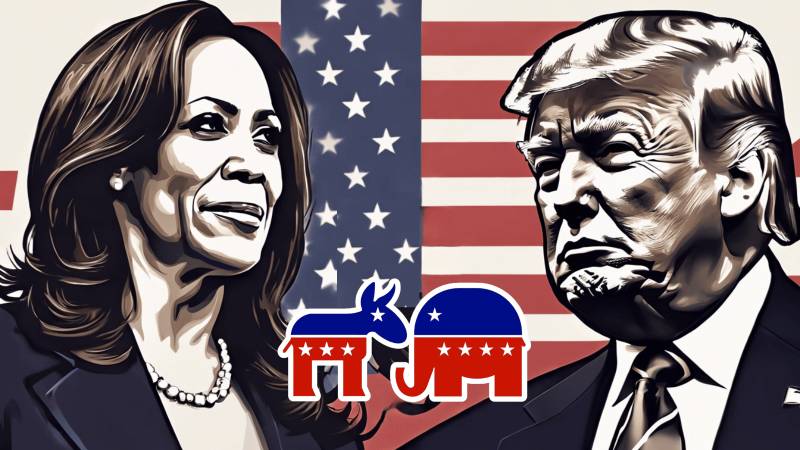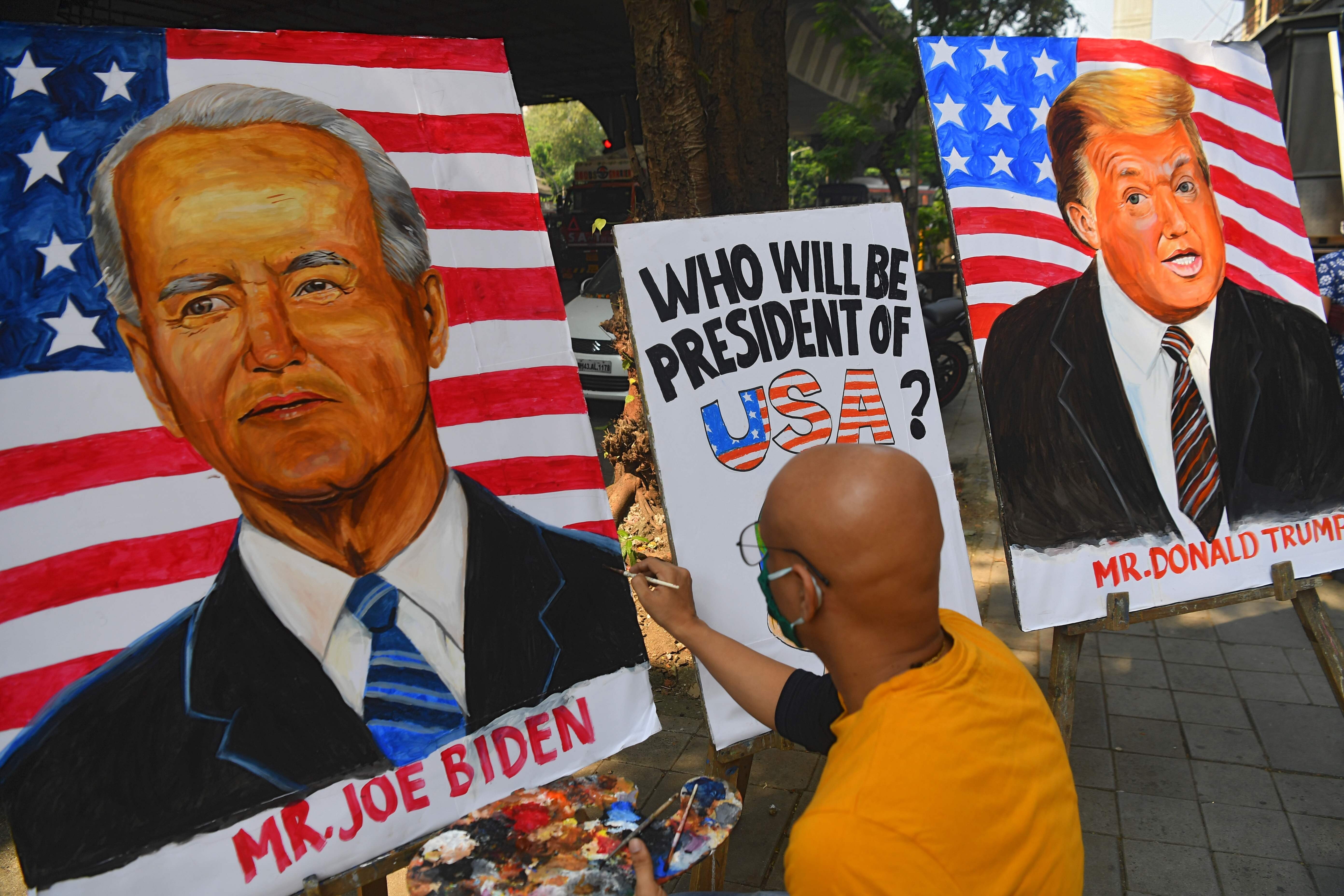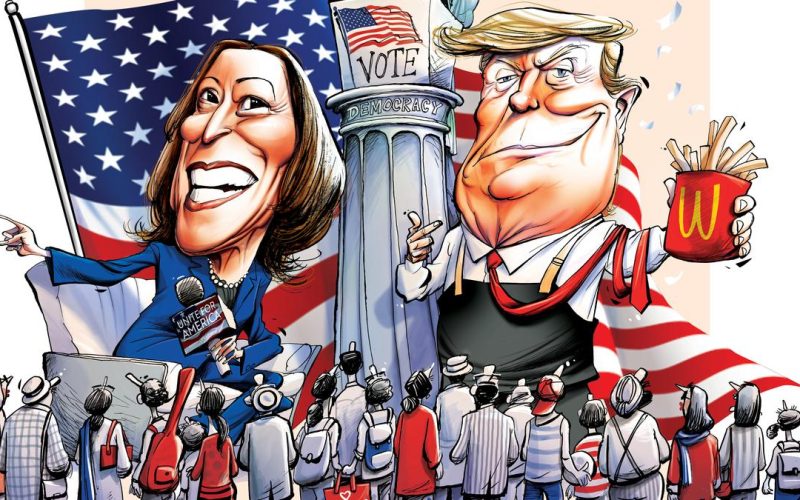The U.S. presidential election is finally on the horizon, and after months of fierce campaigning, it’s crunch time. For Indian American voters, this election isn’t just about choosing between two candidates—it’s about identity, values, and the promise of a future in the country they now call home.
Kamala Harris, the Democratic candidate, has pitched herself as a defender of the Constitution and American values. With her background as a child of Indian and Jamaican immigrants, Harris has represented a point of pride for many Indian Americans.
Yet, as the race tightens, the swing-state power of the Indian American community has put her campaign on high alert.
Donald Trump, with his traditionalist and protectionist rhetoric, is appealing to those who feel their values align with a more conservative vision of America. The polls show a dead heat between the two, with both candidates vying for the influential votes of Indian Americans across the U.S.
How the Indian American Community Has The Power of a Few Thousand Votes
It’s no secret that this election could hinge on swing states, where the race is exceptionally close.
Here, the Indian American community, which numbers around 4,00,000 in key battleground states, is emerging as a decisive factor. Despite being a smaller demographic, their concentration in states like Pennsylvania, Georgia, Michigan, North Carolina, and Arizona gives them a potent edge.
Indian Americans in these states have populations that could easily surpass the margin of victory recorded in the 2020 elections. Hence with this clout, both Democrats and Republicans are rolling out the red carpet.
A recent survey by the Carnegie Endowment for International Peace reveals that while Harris is still expected to command the majority of Indian American votes, her support has slipped from 2020 levels.
In 2020, about 65% of Indian Americans supported the Biden-Harris ticket. Now, the survey projects that Harris might secure about 61% of these votes—a 4% drop.
Additionally, fewer Indian Americans are identifying as Democrats (47%) compared to 2020 (56%). Meanwhile, there’s been a small but noticeable uptick in support for the Republican ticket, which could be just enough to tip the balance in Trump’s favor in close states.
Influential But Divided As Both Parties Court Indian American Voters
In response to this shift, both parties have intensified their efforts to connect with the Indian American community.
Kamala Harris remains a central figure for Democrats, symbolizing progress and multicultural representation. But the Republicans have showcased Indian American voices of their own—Nikki Haley, Vivek Ramaswamy, and Usha Vance are prominent figures within the party, amplifying Trump’s outreach to Indian American voters.
Harris may have the advantage of heritage and identity ties, but Trump’s appeal appears to resonate with some who feel aligned with his vision of a secure, economically stable America. His “America First” mantra speaks to a portion of Indian Americans who appreciate the focus on national prosperity and who may see potential in conservative policy.

Why Indian American Votes Are Crucial in the 2024 Election
With just days to go, the contest between Harris and Trump is razor-thin in battleground states. As FiveThirtyEight’s tracker shows, Harris’s slim lead has narrowed, and both candidates are within two percentage points of each other in the swing states.
In these tight races, Indian Americans, though a small portion of the electorate, could have the final say. Milan Vaishnav, a director at the Carnegie Endowment, emphasized, “Even though the Indian American community is not very big in absolute numbers, they can help swing the decision in one direction or another.”
This isn’t just theoretical. In Pennsylvania and Georgia, both crucial battlegrounds with a combined 35 Electoral College votes, the Indian American population is greater than the margin by which Biden won these states in 2020. This realization has fueled an outreach blitz from both campaigns, as every vote from this community could hold the power to decide who sits in the Oval Office.
Drifting from Democrats, Driven by Gender Divisions and Policy Concerns
In the tight race for the U.S. presidency, Democrats find themselves at risk of losing a traditionally loyal group: Indian American voters. Despite being the largest and most politically active Asian American community, recent surveys show that more Indian Americans, particularly men, are leaning towards the Republican camp—a shift that could impact crucial swing states.
So, what’s causing this drift, and why is it happening now?
The Gender Divide Runs Deep
One of the defining features of this shift is a stark gender divide. Take, for example, Aishwarya Sethi, a 39-year-old Indian American in California. She resonates with Harris’s stance on abortion rights, viewing it as essential for protecting women’s autonomy in the U.S.
However, her husband, who works in tech, is warming up to the Republicans—a shift she can’t fully understand but notices growing each day. “I’ll still try to convince him to vote for greater sexual autonomy,” she says.
This gender-based divergence is becoming more common, with Harris polling well among Indian American women, while her support among men is waning. According to the latest survey, 67 percent of Indian American women plan to vote for Harris, a notable contrast to the 53 percent of men who intend to do the same.
Arjun Sethi, an Indian American lawyer in Washington, DC, explains this gap by pointing to the powerful role of reproductive rights for many women, especially South Asian women. “Reproductive freedom is a paramount concern for women across America,” he says, which might explain Harris’s strong female backing. Meanwhile, more men in the community are leaning toward Trump, drawn to his tough immigration stance and promises of a business-friendly tax environment.
What about young voters?
While older Indian Americans largely favor Harris, younger voters are more split, particularly young men. Among those under 40, Indian American women still strongly support Harris, while men are almost evenly divided between Harris and Trump.
Milan Vaishnav, a co-author of the recent survey, notes that this gender gap within the Indian American community is a recent development, but it mirrors broader national trends.
“Some younger Indian American men express hesitation about voting for a female president,” Vaishnav points out. This sentiment, though concerning for Democrats, is part of a broader national gender gap that has been evolving in U.S. politics.

The Appeal of Trump’s Populist and Nationalist Policies
Then there’s Trump’s appeal. His harder stance on “illegal and undocumented immigration” and his populist rhetoric are primarily directed at a white voter base, but they’re also resonating with a segment of Indian Americans—especially men.
Sangay Mishra, a professor specializing in immigrants’ political incorporation, explains that Trump’s immigration policies might appeal to certain minorities, even though his approach is primarily aimed at conservative white voters.
“Trump’s pitch, although tailored to white audiences, finds its way into minority groups, especially among men,” Mishra says. This cross-over appeal highlights the complexity of Indian American political preferences, where traditional values sometimes align with Republican policies on security and economy.
Skepticism Lingers Despite Democratic Dissatisfaction
Yet, despite the dissatisfaction with Democrats, a complete shift toward Republican identification isn’t on the cards for many Indian Americans.
Mishra warns that while surveys capture a shift in preferences, they shouldn’t be read as a full embrace of the Republican ideology. “For many Indian Americans, the Republican Party’s strong associations with Christian and white nationalist values remain a barrier,” he says.
This ambivalence shows that while some men may be drawn to Trump’s platform, they’re not entirely sold on the broader Republican agenda.
Is Indian Heritage Taking a Backseat in the 2024 US Election?
Kamala Harris, the Democratic candidate in the upcoming U.S. presidential election, has an undeniably diverse heritage: her mother was born in India and moved to the U.S. in 1958, while her father is Black with Jamaican roots. However, Harris has largely identified herself as a Black woman, and that choice hasn’t resonated with all members of the South Asian community.
Many Indian Americans feel she hasn’t fully embraced her Indian background, which has sparked mixed feelings among voters.
Rohit Chopra, a scholar at Stanford University’s Center for South Asia, outlines that Harris’s emphasis on her African American identity may be pushing some South Asian voters away. “There’s actually more enthusiasm for figures like Tulsi Gabbard or Usha Vance within the Indian American community than for Kamala Harris,” Chopra points out. “In the American mainstream, Harris is perceived as African American.”
Chopra explains that Harris’s approach is not just personal but strategic; identifying with Black voters is more politically advantageous due to their substantial voter base. “The ‘Indianness’ simply doesn’t have the same trade-off value,” he notes.
The numbers reflect this complex identity issue.
While 61 percent of Indian Americans plan to vote for Harris, it’s still lower than the 77 percent of Black voters supporting her and only slightly above the 58 percent of Hispanic voters. For Indian Americans, Harris’s appeal as a progressive, liberal candidate matters to about 26 percent of voters. Only 7 percent express enthusiasm about her Indian heritage, and 12 percent say they’re less excited because Harris “identifies more with her Black roots.”
Then there’s also the issue of foreign policy.
President Trump has built a rapport with Indian Prime Minister Narendra Modi, which hasn’t gone unnoticed. In his recent Diwali message, Trump targeted Hindu Americans directly: “We will protect Hindu Americans against the anti-religion agenda of the radical left,” he said. “Under my administration, we’ll strengthen our great partnership with India and my good friend, Prime Minister Modi.”
But Milan Vaishnav, co-author of a recent study on Indian American political attitudes, argues that Indian American voters don’t prioritize U.S.-India ties as a deciding factor. “Foreign policy might matter, but it’s not the core issue,” he says. Both major parties agree on maintaining strong U.S.-India relations, so for Indian American voters, daily issues like jobs, healthcare, climate change, and reproductive rights tend to drive voting decisions more than international alliances.
Snapshot
The Stakes for Indian Americans and the Future of the U.S.
For Indian American voters, this election is as much about personal identity as it is about national policy. The choice between Harris and Trump forces the community to consider what each candidate’s victory would mean for their place in the American dream.
Would a Harris victory reaffirm the role of immigrants in shaping the country’s future? Or would Trump’s return promise stability and an America that aligns with traditional values?
Therefore, as the campaigns enter the final stretch, Indian Americans in swing states have never held such sway in a U.S. election. Their votes may ultimately reflect the sentiments of a community balancing two worlds—their heritage and their American dream. And while only one candidate will claim victory, the influence of Indian American voters has already made them one of the election’s biggest bets.









